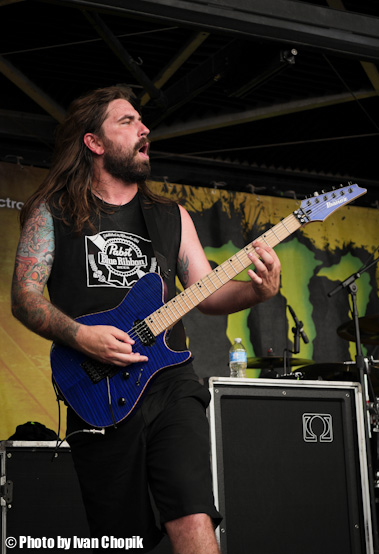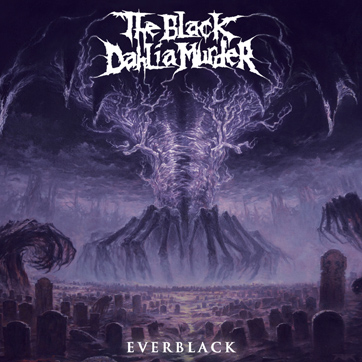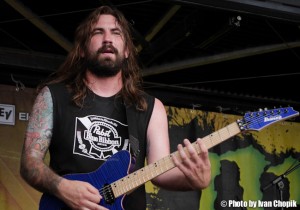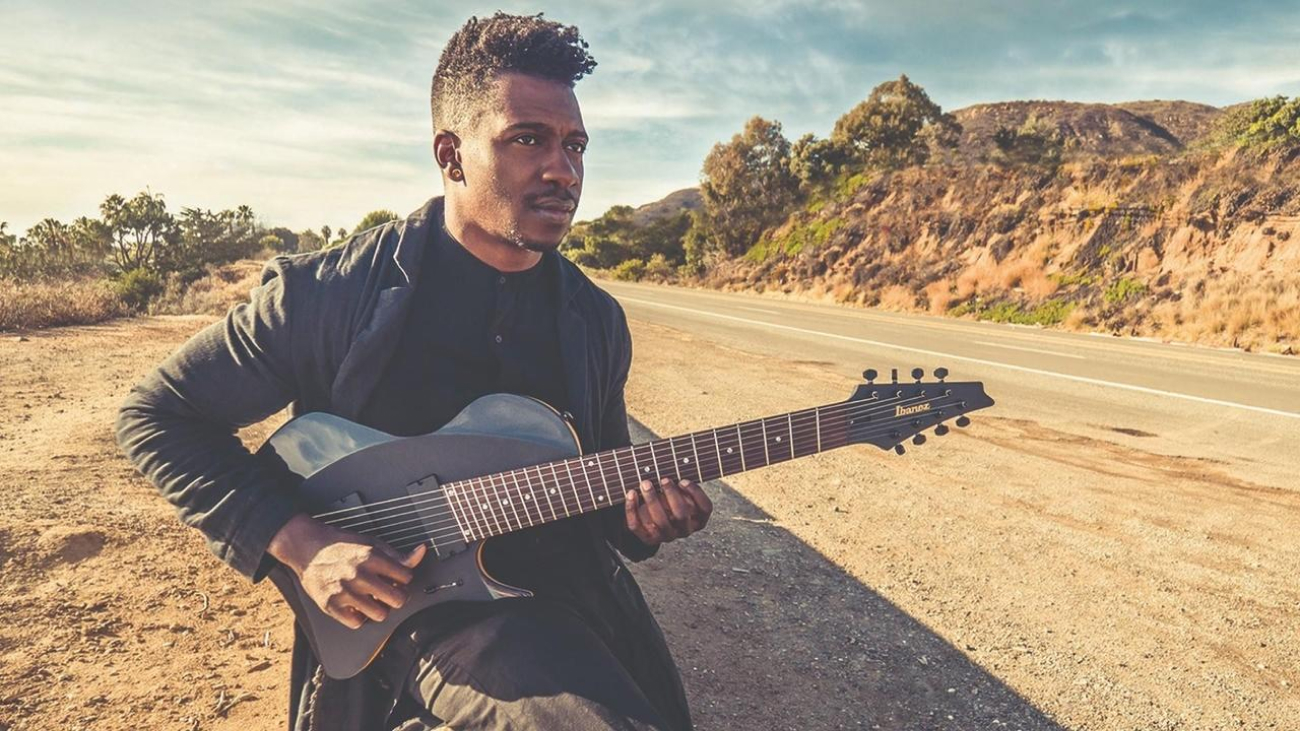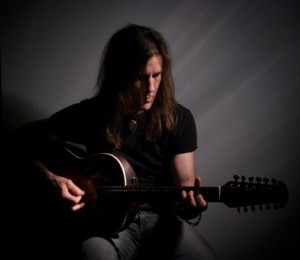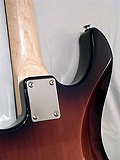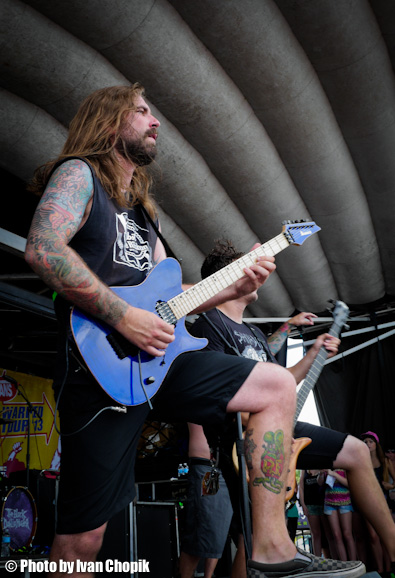 As hard as it can be to stand out amidst the annual metal festival line-ups, The Black Dahlia Murder have managed to do so for over ten years. Metal is nothing if not a survivor’s game, and these guys have thrived by not just absorbing tradition, but by hammering it into their own better image. Born from Detroit with the 2003 release of Unhallowed, the band’s sound continues to grow ever more sophisticated with 2013’s Everblack.
As hard as it can be to stand out amidst the annual metal festival line-ups, The Black Dahlia Murder have managed to do so for over ten years. Metal is nothing if not a survivor’s game, and these guys have thrived by not just absorbing tradition, but by hammering it into their own better image. Born from Detroit with the 2003 release of Unhallowed, the band’s sound continues to grow ever more sophisticated with 2013’s Everblack.
Guitarist Ryan Knight came into the fold during the recording of 2009’s Deflorate, and it was his more melodic approach to lead playing that helped carve out the already classic Ritual in 2011. Originally self-taught, Knight’s ears for grunge music gradually led him to the likes of Eric Johnson and Yngwie Malmsteen. So it should come as no surprise that his solos throughout Everblack leap beyond melodic death metal stylings and instead weave through deeper harmonic explorations. Ryan spoke with Guitar Messenger’s Ivan Chopik recently about his history with the guitar, the new album, and all the beats between:
IC: You’re from Georgia, you live in Chicago, and The Black Dahlia Murder is from Detroit. What are the different music scenes like for you? How would you compare them?
RK: Chicago, I think, has one of the best metal scenes in the country. I’ve never played a bad show in Chicago even back in the days when I was with Arsis. I think Chicago has definitely got one of the best metal scenes.
Detroit – I don’t want to say it’s bad, but it’s more like hit or miss there. We played some shows there where it’s been kind of slack, but at the same… in 2010, we played one of our biggest hometown shows – there were like 700-something people. That was really cool.
Atlanta is always really good. I think Atlanta and the South, in general, is probably one of the best markets you can play. Yeah, I think all cities… I don’t think any of them are bad. They have their strong points, even though Detroit might not be all in all the time.
IC: You just mentioned you were playing with Arsis before you joined Black Dahlia. What was that transition like for you? I understand you were still active with Arsis when you switched over.
RK: It was pretty easy, honestly. At that time in my life, my daughter was just about to be born and I was thinking about quitting Arsis, anyway, just because there was this stuff going on with the band… we couldn’t keep a drummer and just stuff wasn’t going good at the time.
The transition going from Arsis to Black Dahlia was pretty easy. We had just toured with Black Dahlia in the spring of that year, which was May of ’08, so I had kind of gotten to know the Black Dahlia guys then. I was on my way to one of my last Arsis band practices and Mark Lewis [producer, Audiohammer Studios] called me up and was like, ‘yo Ryan, Black Dahlia needs a new guitar player,’ and I said, ‘call Brian [Eschbach, guitarist] and tell him I’ll do it,’ and that was pretty much that. I think the transition was really easy. The two bands aren’t that much different, you know? So, it’s cool.
| Click play above to watch part 1 of the video for this interview. |
IC: How has your role in the band changed over the years, since you first got into the band in 2009 and up until now?
RK: When I first joined in ’09, most of Deflorate had already been written. So I came in pretty much as just a lead guitar player, to handle all the leads and I ended up writing a couple of tracks on it. When we got to Ritual, that was when I got to write more and when me and Brian pretty much took that album split all the writing – so he kind of wrote half of it and I wrote half of it. And then Everblack has been kind of the same way.
Basically since Deflorate, I feel I’ve been able to implement a little bit more of my style, both with writing and lead-wise, I guess. I think every album gets better, for me, at least – like I feel a little bit more comfortable, you know?
IC: As far as your lead style goes, whom would you describe as some of your key influences that make up your sound?
RK: I think the key guys… I’m not saying I sound like Eric Johnson; I don’t really think I take that much influence from him, but Eric Johnson was really one of the first guys that just really showed me the level that you can play guitar at. From then on, Michael Romeo from Symphony X is a really [great influence], Richie Kotzen is a huge one, Emil Werstler… I’ve known Emil for like 10 years. I think we met each other when we were like 19 and ever since I’ve met that guy, he’s always been incredible to me. Per Nilsson; I think I discovered his playing in like 2006 and he’s like one of those guys … I don’t really think my playing sounds much like his, but I just like it a lot. He’s really awesome.
I like Brent Mason a lot, I like Jimmy Herring a lot. This guy, Guthrie Trapp, he’s like a Nashville session guy. I just discovered him about a year, year and a half ago. He’s really, really awesome. That’s kind of like some of the old people and some of the new people that I’m really into… and Yngwie [Malmsteen], of course, Jason Becker, Marty Friedman, Greg Howe.
IC: I was going to say, with [regards to] Jason Becker and Marty Friedman, I get a little bit of a Cacophony vibe every now and then, like in your vibrato and inflections…
RK: Oh, yeah. I really like the ’80s feel, vibrato and stuff. Totally. I mean, Perpetual Burn was one of those first albums I’d ever heard. I will say this: when I was younger, I liked Jason a lot better for the more technical flare, but as I’ve gotten older, I actually … I still love them both, but I prefer Marty more now.
IC: The new album Everblack came out. What’s the feedback been like?
RK: It’s been really good. I think we were kind of worried about having to do this album, because Ritual was received so well and we felt like we needed to top that one. The response has been good… it was the highest selling one in the first week for us, which I was really surprised about. It [sold] about, I think, a thousand more than the previous one, so that’s really cool.
IC: What’s your favorite moment on the album?
RK: There are a few. The song [laughs]… ‘Phantom Limb Masturbation’ has a really long solo in it. It just sounds like really different than anything I’ve ever done and anything that’s been on one of the band’s CD’s. ‘Into the Everblack’ is a really cool song. ‘Raped in Hatred by Vines of Thorn’ – I think that one’s got some almost poppy moments to it. I like the solo in that one. I don’t know. It’s got a lot of good moments, I think.
IC: I like that you guys are having fun with the song titles. It’s a little bit tongue-in-cheek, but it’s so brutal, so it kinda goes along with [the music].
RK: Yeah. Totally just trying to have fun all the time. [laughs]
IC: I think I read somewhere that you guys kind of describe yourselves as a horror movie, but musically [speaking].
RK: I think like Death Metal in general is really … it’s like the music is a horror movie, except it’s audio. Yeah, we’re all horror movie enthusiasts, especially Trevor [Strnad, vocals].
IC: You guys have been shifting around with the lineup a little bit over the last few years. Is it solid now?
RK: Yeah, I mean, Max [Lavelle] is our new bass player… well, he’s not really new – he’s been with us for about two years and Alan [Cassidy], our new drummer, he’s been with us since October and I don’t think we could have found a better [match]. We tried out about seven or eight dudes and Alan just killed it. He’s 23 years old. He’s really young and he’s fun to be around. He doesn’t ever complain or anything. I think we nailed it with Alan.
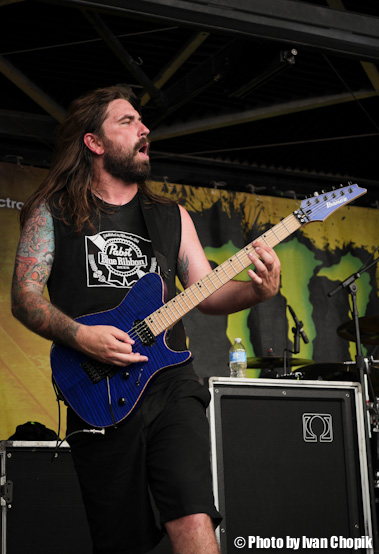
IC: I want to track back and find out what originally got you into playing and how you progressed from there – how your influences changed over the years to where you are now.
RK: Well, my mom plays piano. My dad sings. I guess I came from a pretty musical family. One of my best friends’ older sister used to babysit me, and this is like back in like ’89, ’90, ’91… so I think just having her around blasting MTV all the time, which played videos and music – Guns N’ Roses, Black Crowes, and Bon Jovi and all that stuff that was on… seeing that really just make me want to play guitar.
I think I picked up the guitar for the first time in about ’90 or ’91. For some reason, being that young, I was under the impression that to make loud, fast guitar solos that I was hearing at that time (Poison and stuff like that was in the background), I was like, ‘You just bang on it and it makes that sound.’ Of course, when I got my guitar, I was like, ‘Oh no, you actually have to know how to play it.’ I put it down for two or three years and then when I was I guess twelve, I picked it back up, and that’s when I started learning Alice in Chains, Nirvana, Offspring and stuff like that.
IC: This is the mid-90s at this point?
RK: Yeah. I was really into Soundgarden and that whole Seattle thing. That’s some of the first stuff I learned. And then I guess when I was sixteen on some trip I was on, I saw Eric Johnson play on Austin City Limits and I was like ‘Whoa, that’s insane!’
And from then on, that made me want to explore and I think Yngwie was the next guy after that, and then it just snowballed. I started finding out about all these other dudes. From the time I was seventeen or eighteen to the time I was about twenty-two or twenty-three, I just … I went to college briefly and I was just wood shedding; practicing my technique and stuff like that.
IC: Music college?
RK: No, I didn’t go to music college. I was just in college for… I don’t even remember what I was going for. [laughs] I think I was originally going to go for music, but I ended up going for journalism or marketing or something. Anyway, all I pretty much did was just play guitar the whole time I was in college.
Then, I was about twenty-two or twenty-three when I got the Arsis gig, so I started touring a lot. Then that lead to [joining Black Dahlia Murder] and then I started taking guitar lessons again like three years ago. I just got to a point where I had all this information that I knew, but it wasn’t put together, organized.
I wanted to take from a jazz dude, because I know those guys could teach me the way, you know? About three years ago, I found a really good jazz teacher up there in Chicago and he pretty much started me all the way over and it was like, ‘You know a lot of stuff, but it isn’t organized.’ I knew scale fragments here and there and he’d be like, ‘Okay, here’s how to put them all together on the fretboard.’ Just on and on… maybe I’ll start sight-reading again, which I hate…
IC: For us guitar players, tab is kind of is in the way…
RK: Yeah, especially after reading tab for so long.
IC: I bet you can sight-read tabs.
RK: I can pretty well, actually. I’ve done it so much that yeah, I can. And I’m by no means a jazz guitar player. I learned a lot from the concepts and stuff. A lot of it is even still sinking into my brain.
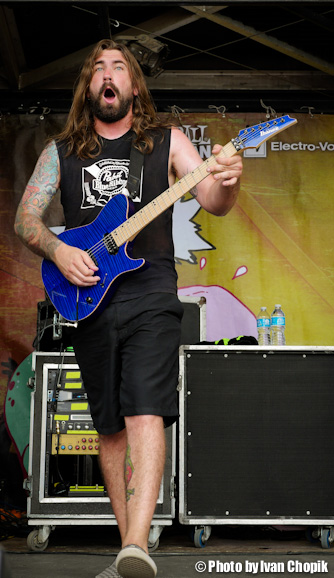
IC: What are you working on these days as a guitar player?
RK: I worked on technique for so long that now, when I’m home and I have free time, I just try to practice improvising over chord changes, I-IV-V’s and ii-V-I’s, stuff like that. I just feel like I’m so far behind. I wish I would have gotten into that at least like six or seven years ago.
If there is like lydian dominant or something, I’ll just take a chord and just play lydian dominant over it to get familiar with the sound. I’m slowly, very slowly, taking all these new concepts and trying to put them to use and whatnot.
IC: Do you think there’s room to incorporate those kinds of sounds into death metal, as well?
RK: Yeah, I totally do.
IC: I know a big part of your sound is [your use of] diminished and augmented [tonalities].
RK: Starting on this album, I think, I got a little bit closer to doing what I actually wanted to. I feel like I’m still not able to totally comprehend what I’m doing sometimes. I know what I’m doing, but it’s hard to explain. You know how it is…
The diminished thing; I think I’ve run that into the ground. I tried to get away from it, but it’s still there though. I think what I should do with diminished is I should start using more of the actual scale, like half-whole or whole-half diminished. I want to try and start doing more of that and try to use more like chromatics and stuff like that. I like melodic minor a lot. I really like the sound of that scale and some of its modes.
IC: It’s so under-utilized in this style.
RK: It really is. Some guys like Per [Nilsson] and… I think maybe The Faceless sound like they use that sometimes. I love all that stuff. I think there is way more room for use of that death metal and I’m not going be the one to frontier it, but other people will be and I will follow suit. [laughs]
IC: Is that where you’re reaching for – incorporating more of those different sounds?
RK: Right. I want to start using more stuff that you don’t hear like melodic minor and lydian dominant, like I said. Instead of just hearing the major 7 sound, maybe major 7#5 sounds. Just stuff that you generally don’t hear in metal.
I would love it if I could totally just play country music, but in death metal. I know the major pentatonic and dominant scales sometimes just sound weird, but hey man, Dimebag did it, Emil does it – so there are ways to do it, you know? I’m still searching for what I want to do with it, though.
IC: It’s not very evil sounding most times.
RK: Yeah, it’s not. But you know what? A lot of times, there’s people like, ‘Man, Ryan’s sound is just not dark enough for the band.’ I’ll be the first to admit: my ear, for whatever reason, gravitates more to major sounds than minor sounds a lot of times. I don’t know. That’s what my ear wants to hear.
IC: Maybe part of that comes from growing up in the South? You get a little bit more country and classic rock over there.
RK: Yeah. I don’t know. It’s weird how you’ll see the South and they’ll use the major pentatonic, but then when you go North, you know, Chicago blues and stuff, it’s all minor pentatonic. It’s weird. [laughs]
[Special thanks to Ben Mayer for his excellent camera work and last minute help, and Josh Hofmann for his assistance with this video shoot.]
Continue to part two
Click HERE to check out the second half of our conversation with Ryan, as he digs into more details about his gear and divulges what beer he’s most likely to be drinking while watching Netflix.
The Black Dahlia Murder “Goat of Departure” (OFFICIAL VIDEO) |



